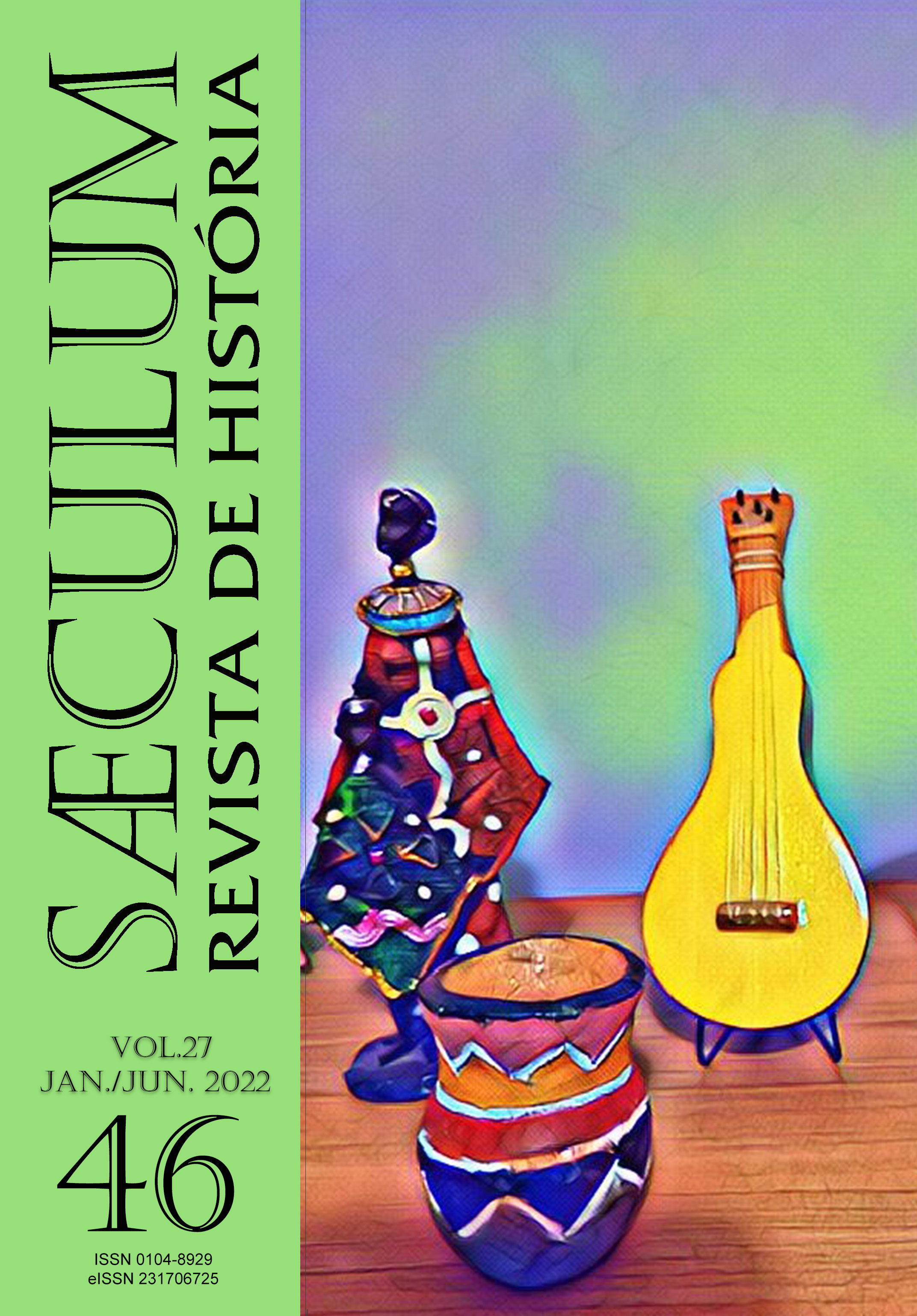The foundations of knowledge in Hugo de São Vitor's Didascalicon: an analysis of the medieval representation of human nature in its relationship with divine Wisdom
DOI:
https://doi.org/10.22478/ufpb.2317-6725.2022v27n46.61842Keywords:
Middle Ages, Speculative mystique, Medieval Science, Hugh of Saint Victor, DidascaliconAbstract
In this article, we will analyze the foundations of knowledge presented in the school program of the Parisian Canon Hugo de São Vítor (†1141) called Didascalicon: de studio legendi (1127). We start from the premise that any minimal attempt to reconstruct a theory of medieval knowledge is subject to the analysis of the relationship between man and God, especially when dealing with the analysis of the curricular proposal of Hugo de São Vitor, who even considers the theoretical dimension of mechanical arts as parts of philosophy. Therefore, we will start our study seeking to understand the recurrent concept of Wisdom in the Victorian work from the analysis of the cultural transmission of the Church Fathers' Platonisms up to the 12th century. Next, we will seek to apprehend in Hugo de São Vitor his representation of the human soul and its natural qualities (memoria and ingenium), as well as the important medieval theological concept of divine "illumination" of the human spirit, seeking to understand it as an enabler of understanding of true reality from the unwinding of the eyes of contemplation. At the end of the article, we will reflect on the advantages of this method of analyzing medieval knowledge, also pointing out the possibilities for continuing this study from other sources and thematic research subtopics.
Downloads
References
Fontes
ABELARDO, Pedro. Ética, ou Conhece-te a ti mesmo (Scito et ipsum). Campinas: Ecclesiae, 2016.
AGOSTINHO, Santo. A doutrina cristã: manual de exegese e formação cristã. São Paulo: Paulus, 2014.
AGOSTINHO, Santo; AQUINO, Santo Tomás de. Sobre o mestre. Campinas: Kírion, 2017.
CLARAVAL, São Bernardo. Opúsculo sobre o livre-arbítrio. Campinas: Ecclesiae, 2013.
DE SÃO VÍTOR, Hugo. De unione corporis et spiritus. In: PORCELL, Joan Martínez. De unione corpis et spiritus. Espíritu LXIV. [s.n.], n 150, p. 397-421, 2015.
DE SÃO VÍTOR, Hugo. Didascálicon da arte de ler. Petrópolis: Vozes, 2001.
DE SÃO VÍTOR, Hugo. Noah’s Ark I. In: Hugh of Saint-Victor: Selected Spiritual Writings. Eugene, Oregon: Wipf & Stock, 2009, p. 45-156.
DE SÃO VÍTOR, Hugo. The three best memory-aids for learning history. In: Carruthers, Mary. The book of memory. Cambrigde: Cambrige Universiy Press, 2008, p. 339-344.
DE SÃO VÍTOR, Hugo. Didascálicon sobre a arte de ler. Campinas: Kírion, 2018.
KANT [et al.]. O que é esclarecimento? Rio de Janeiro: Via Verita, 2011.
PLATÃO, Diálogos V: O banquete; Mênon (ou da virtude); Timeu, Crítias. Bauru: EDIPRO, 2010.
SÃO VÍTOR, Hugo de. A arte de Ler. Campinas: Vide Editorial, 2015.
Referências
Oxford Latin Dicitionary. Oxford University Press, Ely House, London W.I, 1968.
BASCHET, Jêrómê. A civilização feudal: do ano mil à colonização da América. São Paulo: Globo, 2006.
BONI, Luiz Alberto de. A ciência e a organização dos saberes na Idade Média. Porto Alegre: EDIPUCRS, 2000.
BROCCHIERI, Mariateresa. O intelectual. In: LE GOFF, Jacques. O homem medieval. Lisboa: Editorial Presença, 1989, p. 125-141.
CARRUTHERS, Mary. Uma arte medieval para a invenção e para a memória: a importância do “lugar”. Remate de Males, vol. 26, n. 1, p. 17-29, 2006. DOI: https://doi.org/10.20396/remate.v26i1.8636052
CARRUTHERS, Mary. The book of memory. Cambrigde: Cambrige Universiy Press, 2008 DOI: https://doi.org/10.1017/CBO9781107051126
CHENU, Marie-Dominique. Nature, man and society in the twelfth century. Chicago: University of Chicago Press, 1997.
GILSON, Etienne. A filosofia na Idade Média. São Paulo: Martins Fontes, 1995.
ILLICH, Ivan. In the Vineyard of the Text. Chicago: The University of Chicago Press, 1993.
LE GOFF, Jacques. Os intelectuais na Idade Média. Rio de Janeiro: José Olympio, 2003.
LE GOFF, Jacques. A civilização do Ocidente medieval. Petrópolis: Vozes, 2016.
KOBUSCH, Theo (org.). Filósofos da Idade Média: uma introdução. Porto Alegre: Editora Unisinos, 2005.
LIBERA, Alain. A filosofia medieval. São Paulo: Edições Loyola Jesuítas, 2017.
LIBERA, Alain. A filosofia medieval. Rio de Janeiro: Jorge Zahar Editora, 1989.
MORA, José Ferrater. Diccionario de Filosofía. Tomo I, Buenos Aires: Editorial Sudamericana, 1964.
MORA, José Ferrater. Dicionário de Filosofia. São Paulo: Martins Fontes, 2001.
NUNES, Ruy Afonso da Costa. História da Educação na Idade Média. Campinas: Kírion, 2018.
ROREM, Paul. Hugh of Saint Victor: great medieval thinkers. New York: Oxford University Press, 2009. DOI: https://doi.org/10.1093/acprof:oso/9780195384369.001.0001
SILVA, Filipe. Teologia e teoria das ciências em Hugo de S. Victor. Medievalia. Textos e estudos, 21, 2002.
TAYLOR, Jerome. The Didascalicon of Hugh of Saint Victor. Nova York: Columbia University Press, 1991.
VERGER, Jacques. Homens e Saber na Idade Média. Bauru: Edusc, 1999.
SANTOS NETO, João. Pensados na Mente de Deus: os fundamentos do saber em Hugo de São Vítor. Dissertação (Mestrado em História). Manaus: Universidade Federal do Amazonas, 2021.
Downloads
Published
How to Cite
Issue
Section
License
Copyright (c) 2022 João Paulo dos Santos Neto

This work is licensed under a Creative Commons Attribution-NonCommercial 4.0 International License.
A revista Sæculum permite aos autores a manutenção dos direitos autorais pelo seu trabalho, no entanto eles devem repassar direitos de primeira publicação ao periódico.











